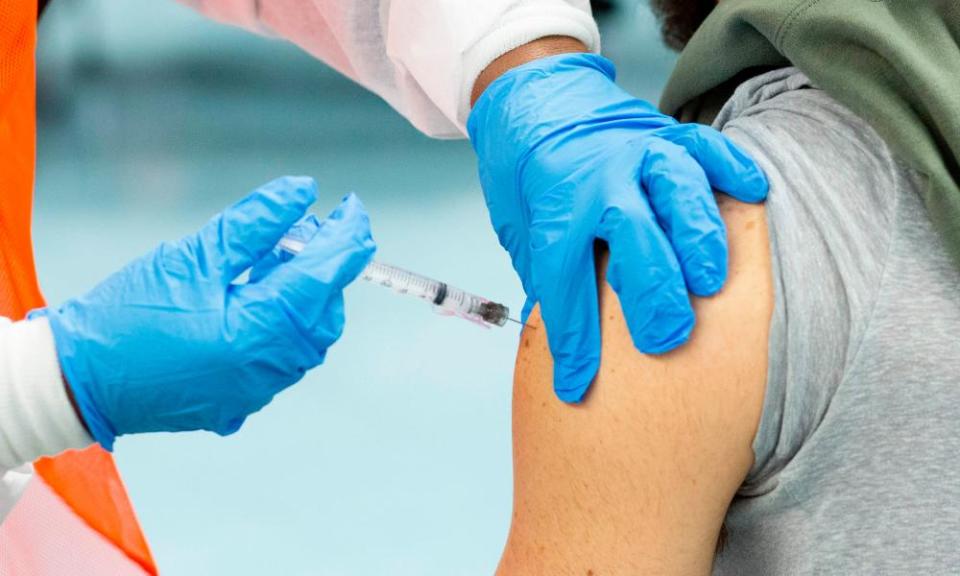Moderna begins work on booster to protect against South African variant
Watch: Moderna says its vaccine works against new variants
The vaccine manufacturer Moderna has started work on a booster for its Covid jab to improve protection against a new variant of coronavirus first detected in South Africa.
The US biotech firm said it had launched the work “out of an abundance of caution” after research suggested the vaccine may be less effective against the variant than older forms of the virus.
Lab tests on the vaccine performed by Moderna and the US National Institutes of Health found protection was unchanged against the B117 variant first spotted in the UK in September, but antibodies against the variant from South Africa suffered a six-fold drop in potency.
The company said it still expected the vaccine to be protective because the antibody levels remained high enough to neutralise the virus.
The announcement came as scientists warned that the variant from South Africa, known as 501Y.V2 or B1351, may be more deadly than the virus that fuelled the first wave of infections. A study by the London School of Hygiene & Tropical Medicine (LSHTM) found hints that the variant may have a higher death rate, but the work is preliminary and needs to be confirmed by more detailed studies.

On Friday, the government’s New and Emerging Respiratory Virus Threats Advisory Group (Nervtag) revealed that the B117 variant appeared to be 30% more lethal than earlier forms of the virus. It is already known to be more transmissible.
John Edmunds, a professor of infectious disease modelling at LSHTM, who sits on Nervtag and the Scientific Advisory Group for Emergencies (Sage), said early analysis of the variant from South Africa suggested “there may be a hint of increased mortality” but that further work was needed to be sure.
Related: New UK Covid variant may be 30% more deadly, says Boris Johnson
The study found that South Africa’s case fatality ratio – the proportion of people dying after a positive Covid test – rose from November last year as the new variant spread, but factors other than greater lethality could be to blame. Researchers in South Africa are investigating the trend but have said the rise may be driven by other factors such as busier hospitals.
Scientists discovered the higher lethality of the UK variant by comparing death rates among those who tested positive for the new variant with older forms of the virus. A crucial part of the analysis was to compare patients of the same age, sex, ethnicity and medical history, and to match other factors such as the pressure on the hospital they were treated in, since death rates may be higher in hospitals that are overwhelmed.
Edmunds said such detailed work was needed to understand other new variants, such as 501Y.V2 and yet another new variant that emerged in Brazil. “That’s the kind of study that has to be done to determine whether there really is an increased risk of death with the South African or Brazilian variants, and that has not been done as far as I’m aware,” he said.
On Sunday, the health secretary, Matt Hancock, said the UK had detected 77 cases of the variant first spotted in South Africa and nine cases of the variant from Brazil.
It is unclear how the mutations in the new variants change the virus’s behaviour, but all three carry a mutation known as N501Y, which enables the virus to bind more strongly to human cells. Many scientists suspect this helps the virus infect cells, making it spread more easily from person to person.
Watch: Brazil COVID crisis as deaths soar
“That’s the most plausible biological explanation for the observed increase in transmission and possibly the increase in severity that we may be seeing,” said Peter Horby, chair of Nervtag and professor of emerging infectious diseases at Oxford University. The variants from South African and Brazil have another mutation, called E484K, which may make them partially resistant to vaccines and existing immunity.
Graham Medley, professor of infectious disease modelling at LSHTM, who also sits on Sage, said that whether or not the lockdown should be tightened or lengthened because of the more dangerous UK variant was for the government to decide. “Reducing the incidence is the critical thing,” he said, referring to the UK’s high number of new cases. “As far as the NHS is concerned, we’re still faced with same urgent situation.”

 Yahoo Finance
Yahoo Finance 